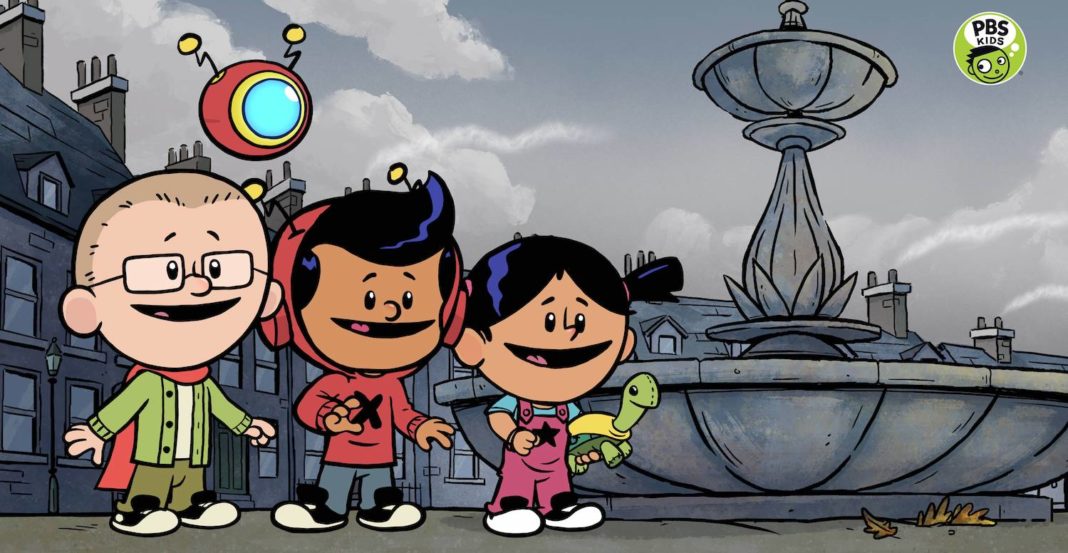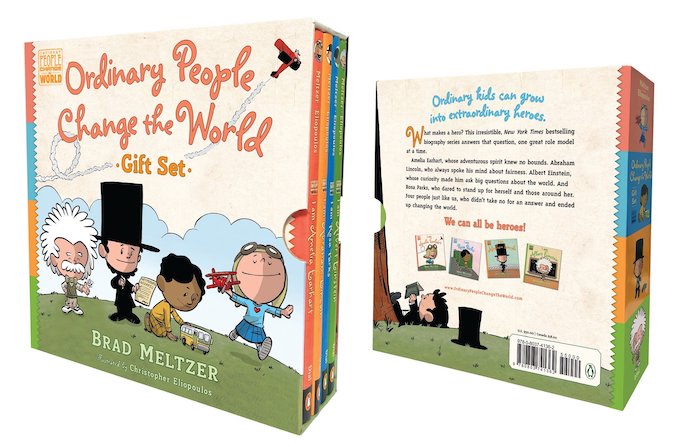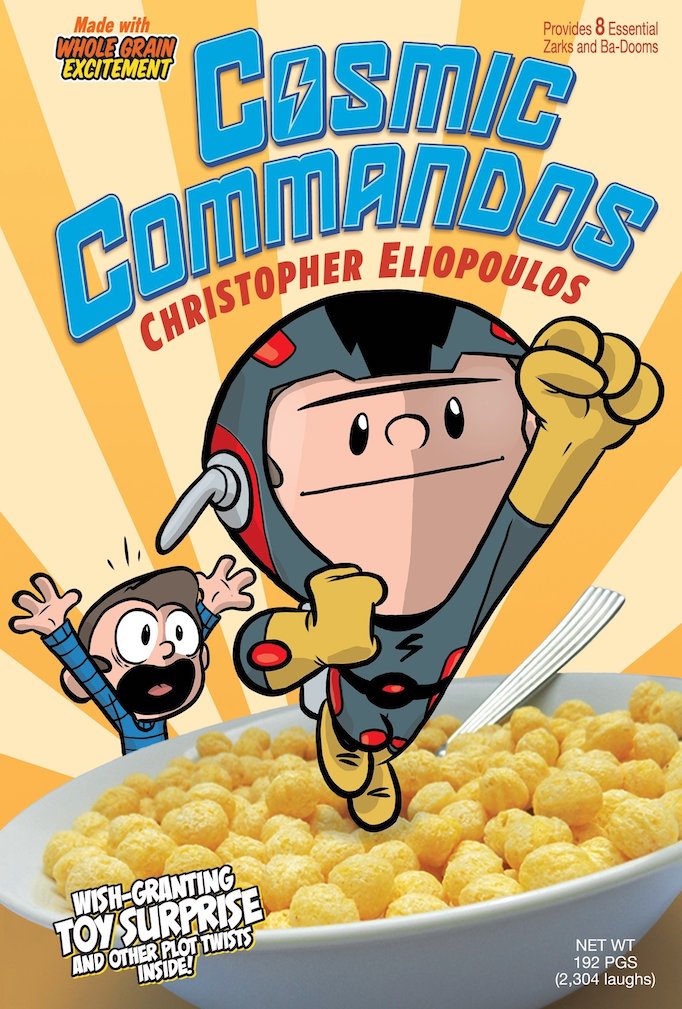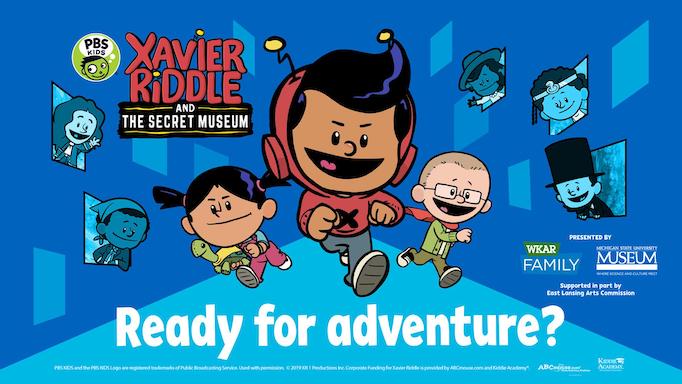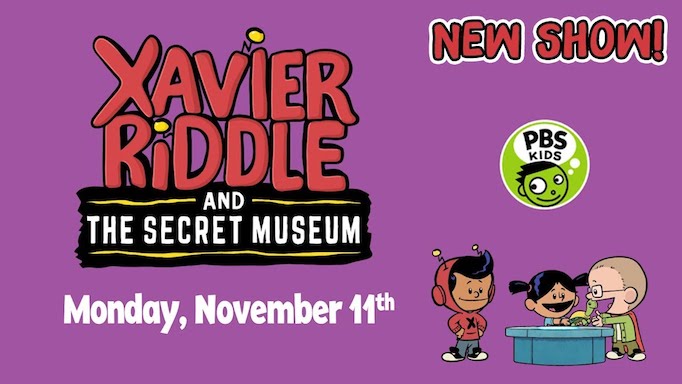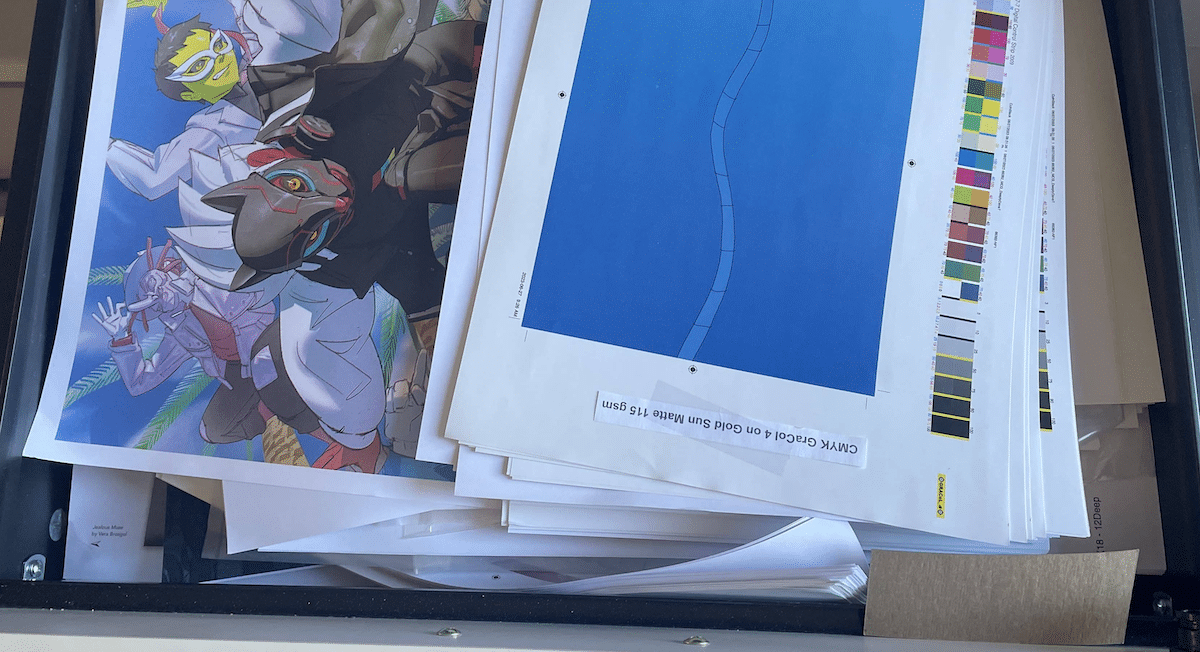Chris Eliopoulos has been one of my favorite cartoonists for over a decade. That was first due to his Franklin Richard comics at Marvel and later because of his Misery Loves Sherman strips in the relatively early days of webcomics.
Neither project found the audience they deserve, though, so I was excited to see Eliopoulos achieve mainstream recognition for his Ordinary People Change the World series of children’s books with bestselling author Brad Meltzer and the recent Cosmic Commandos graphic novel. Just last week Chris’ success reached new heights with the debut of XAVIER RIDDLE AND THE SECRET MUSEUM, a PBS animated series produced by himself and Meltzer. The entire first episode is available now, and I highly recommend it to parents of young children:
I was so happy to meet Chris Eliopoulos at this year’s New York Comic-Con and to interview him about his latest projects, as well as learn how working in other industries has informed his view of the comics market he spent most of his life in.
You spent years as one of the top letterers in comics before getting the opportunity to make children’s books. Did you see a future for yourself as a full-time illustrator or had you come to expect lettering to remain your primary focus?
I always dreamt of being a professional cartoonist. When I went to college, I told my parents that I wanted to do just that, but they were worried. They asked me to study something safe like graphic design which had a greater chance of providing me with a living. In my last year of college, I was taking a minor in illustration and had a class with the great Gene Colan, who took us on a field trip to Marvel where I applied for an internship.
When I got there, they saw my graphic design portfolio and knew I understood type, so they groomed me to be a letterer. I read that Charles Schulz started as a letterer, so I thought I’d be in good company. To be honest, I stayed with it because it paid well and it was a career in comics. But on the side, I was always drawing.
With your busy schedule, how much time do you have left for lettering?
I run Virtual Calligraphy which letters most of the Marvel comics. I have 5 talented and professional guys working with me—Joe Caramagna, Cory Petit, Clayton Cowles, Travis Lanham, and Joe Sabino. I really don’t letter much myself these days, but do a Buch of work behind the scenes including covering pages or setting files up for them. Just to keep the schedule moving.
How did you first connect with Brad Meltzer?
Twitter. We laugh that Twitter is a cesspool of negativity, but there are brief shining moments where something good happens. We were aware of each other but never worked together. I’m a huge history nerd like Brad and when his shows were on, we’d go back and forth on Twitter. Then one day I sent him my Franklin Richards and Cow Boy comics for his son. Then one day he just asked me to help him create hero t-shirts, which we did. Then he said that we’re book people. We should make books. So, he asked me to put together a picture book based on an essay he wrote about Amelia Earhart. Then we just became thick as thieves.
What was it like to have your work exposed to a whole new audience with the Ordinary People Change the World series?
It’s where I belong. I love comics and I tried doing work writing and drawing in the mainstream market for comics, but readers aren’t into my kind of work. Franklin and Pet Avengers did well, as did Cow Boy, but I think my work appeals to a different market and I think that market is children’s publishing. I’ve been going out on book tours around the country and it’s amazing to see children responding to the work! And now I’ve been hearing from fellow comic book people telling me how much their kids love the books, so we’ve come full circle.
You recently wrote and drew the children’s graphic novel Cosmic Commandos. Was that a project that had been on your wish list for some time?
Yeah. That one is based on my twin sons. Cosmic Commandos and its follow-up, Monster Mayhem, were something I’ve wanted to do for a while. I spent over 10 years trying to convince people in the mainstream comic companies to reach out to that market. If we started producing comics for kids again, we could rebuild the market, but no one was having it. So, I decided to pitch one to my publisher and she bought it. This year Cosmic Commandos is nominated for the Sunshine State Young Readers award and it’s getting into the hands of kids all over Florida. My hope is that my books and others like Hilo by Judd Winick and Raina Telgemeier’s books will raise a new generation of comic readers.
During your experiences creating Ordinary People Change the World and Cosmic Commandos, were you surprised by the differences between mainstream comics and traditional book publishing?
Totally surprised. It’s a different world. The goals are different, the timeframes are different, even the subject matter is different. My current books are usually done 9-12 months in advance of publication. In comics, I’d finish a book and it would be out on stands 3 weeks later. When working on Cosmic Commandos, it was all action, which is something I picked up from mainstream comics, but in the publishing world, my editor told me there needed to be quieter, emotional moments. Pages of people just talking. My work has changed as well. I’ve adapted to the goals of children’s publishing to not just entertain but to provide emotional and intellectual learning.
What was it like to learn that PBS picked up an animated series inspired by your work in your art style?
When Brad and I pitched the series, we approached it like we do the books. He wrote up the premises and I drew up sample art. When PBS Kids decided to pick up the series, they said that whatever the series becomes, it should look like my artwork which was extremely gratifying. It’s smart, too because the characters they see on the show look exactly like the ones in the books and they connect the dots. But on a personal level, I couldn’t believe it. I grew up on Sesame Street and Mister Rogers and The Electric Company. They all shaped who I am and to know that I’m continuing in their footsteps is mind-blowing.
How involved are you in the day-to-day production of XAVIER RIDDLE AND THE SECRET MUSEUM?
Brad and I are executive producers and consultants. We decided to split the work as we did on the books. He works on the story and I work on the art. I design all the characters. I basically gave 9 Story, our animation team, a course in how to draw like Chris. I also choose the voice actors and sit in on recording sessions. We’re lucky to have a great team at 9 Story, but we have weekly meetings and Brad and I stay involved every day. We’re spending a portion of every day doing some work on the show.
An animated series is a much larger production than comics or children’s books. Does that create any additional challenges or new opportunities?
It’s extremely overwhelming. When we got approved for series, it became a mad dash. We had 72 11-minute episodes, interstitial material, the opening, with the music, the character designs, the movie all in the pipeline immediately. It’s a hard deadline and it is a lot of work. This all started with just Brad and I. Then we got our publisher and their team which expanded our roles, then the TV show, just exponentially exploded outward. When you have decisions to make every day, choices to make, people to guide, it adds a lot to your workday. But, it’s also been an amazing thing to see. All these people buying into our original premise that ordinary people can change the world. And now I get to know that what we’re doing may raise a new generation on kindness, love, and compassion.
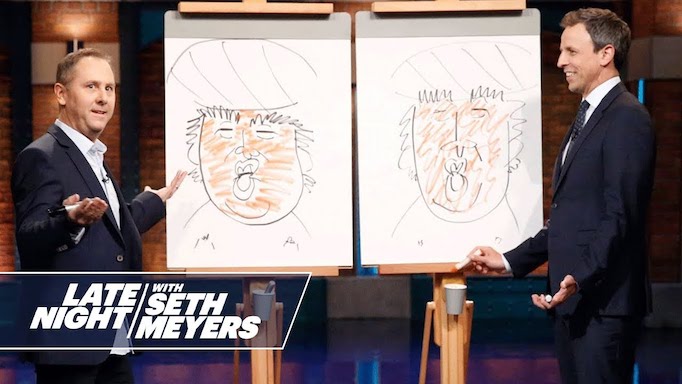
Has your experience in books and animation given you any ideas about how comics can adjust to become a more mainstream form of entertainment for children and adults?
As I’ve said, I think for mainstream comics to survive, they need to reach new markets. They need to create new formats, put out more all-ages friendly material, get out to bookstores and target people who don’t read comics. I’m dumbfounded that heads of these companies don’t see the sales numbers of Raina and Dev Pilkey’s books and change their business plans. They need to start making graphic novels for children. They need to sell them in bookstores and places like Walmart and Target, not just in comic shops. They need to have material that doesn’t require the reader to know 50 years of continuity. They need to start advertising, they need to change the perception of comics in the real world. When I first proposed doing comics to children’s publishers, they all thought comics were violence and misogyny. They aren’t, but that’s the perception. Also, a lot of people believe comics aren’t “real” books. We have to show them that if they want children to learn to read, comics are the best transition for them to go from picture books to prose. There is so much that’s possible with comics, we just need to make that leap.
Thanks to Chris Eliopoulos for taking the time to do such an enlightening interview. You can follow him on Twitter @ChrisEliopoulos and his website chriseliopoulos.com.
Matt Chats is an interview series featuring discussions with a creator or player in comics, diving deep into industry, process, and creative topics. Find its author, Matt O’Keefe, on Twitter and Tumblr. Email him with questions, comments, complaints, or whatever else is on your mind at [email protected].


